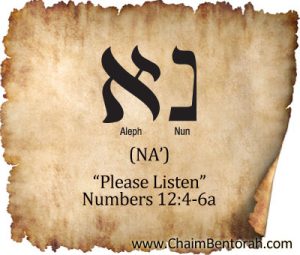HEBREW WORD STUDY – PLEASE LISTEN – NA’ נא
Numbers 12:4-6a: “And the LORD spake suddenly unto Moses, and unto Aaron, and unto Miriam, Come out ye three unto the tabernacle of the congregation. And they three came out. (5) And the LORD came down in the pillar of the cloud, and stood [in] the door of the tabernacle, and called Aaron and Miriam: and they both came forth. (6a) And he said, Hear now my words:”
 Yesterday we examined the sudden or surprise voice of God interfering in Miriam and Aaron’s attempt to correct Moses. He invites Miriam and Aaron to join Him and Moses in the Tent of Meetings. In verse 4 we learn that they went out to the Tent of Meetings, all three of them.
Yesterday we examined the sudden or surprise voice of God interfering in Miriam and Aaron’s attempt to correct Moses. He invites Miriam and Aaron to join Him and Moses in the Tent of Meetings. In verse 4 we learn that they went out to the Tent of Meetings, all three of them.
Then something else unexpected happened. The Lord came down in the cloud, but He did not enter the tent. Instead, He called Miriam and Aaron to step out of the Tent of Meeting leaving Moses inside. It was almost as if God said: “Go to the Tent of Meetings and wait for me.” However, I don’t believe God had other business to attend to, he was only playing the manager in the Auto Sales department. You know how the salesman will tell you to wait while he consults his manager and gives you time to think over his offer, get your head together while he and the manager she a cup of coffee and talk about the Bears chances of winning the Stanley Cup. I believe God left withheld His manifested presence to give Moses, Miriam, and Aaron a chance to sort out what just happened. I mean this sudden manifestation of God’s voice was big to Aaron and Miriam, but it was just old hat for Moses. “Yeah, Moses, I have to admit, God never spoke to us like that. I think maybe we did cross a line here, we apologize.” “Apology accepted but don’t you think there is someone else you should apologize to?” Moses said as he pointed to the entrance of the Tent.
The cloud now appears outside the entrance of the tent, but God does not enter, he stands at the entrance. There are a number of words in Hebrew that are used for standing. This one is quite unique. It is standing in support, a standing of affirmation. In other words, “All those who are in favor please ya’amod (stand)” God was standing outside the tent showing His support of Moses
I read in the Sifrei, another Jewish commentary that God separated Moses from Miriam and Aaron because when we discuss something about someone we should wisely not to related all of one’s good points in their presence for fear of making them feel patronized, embarrassed or causing them to swell with pride. But in their absence, we will relate them all. That is why God separated Moses from his brother and sister, Moses was a humble man and to hear such wonderful things from the mouth of God would not be beneficial.
Boy, are Miriam and Aaron about to get a tongue lashing. Well, that is what many translators would like you to think. Translators assume God is really angry and upset, besides Himself with anger so they do not translate that little word na’ with the nuance that is intended behind that word. Many modern English translations just ignore the word na’ and those that do it use it to express a stern command, like; “Now you listen here.” I don’t blame translators for doing that for how can they justify a proper interpretation when you have a verse like verse 9 “And the anger of the LORD was kindled against them; and he departed.” Sounds like God was pretty upset, he gives Aaron and Miriam a good tongue lashing and then departs. Yet, that word na’ is rarely used as a command, it is a plea, an entreaty, an earnest request. In fact Rashi, the Jewish commentator says that na always denotes a request and is not to be used as a command which all our Christian translators do. God was not angry at this point, he was pleading with Miriam and Aaron to really understand what is going on. So why does verse 9 suggest He is angry? Stay with me I will discuss that at another time, just keep following this series.
I believe there is a lesson here for all of us. We have a rift with a family member or a friend. We go an apologize but how often do we remember to apologize to God? Part 3 reveals something very interesting in the Midrash about our relationships with others, don’t miss our next exciting episode:
HEBREW WORD STUDY – PART 3 – LIKE CARRYING A BABY








Me, too!
Standing by with bated breath:-))))
Me, too!